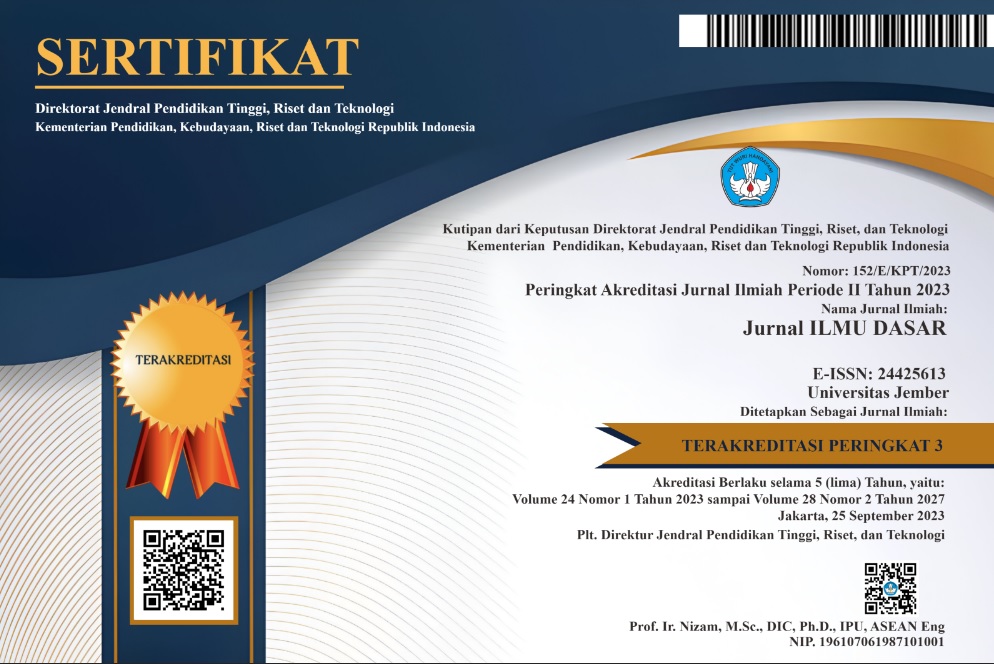Application Effect of Potassium on Rice (Oryza sativa L.) Recovery After Drought Stress
DOI:
https://doi.org/10.19184/jid.v21i2.12813Abstract
The critical phase of rice plants on water availability includes the vegetative phase when tillering stage, generative phase 1 at panicle initiation stage and generative phase 2 when booting stage. The lack of water in the vegetative phase and in the generative phase will disturb the growth of rice plants. However, if the water needs are fulfilled immediately, the plants will recover and able to grow normally. The ability of plants to do recovery can be improved through the application of potassium fertilizer. This research aimed to determine the optimum dosage of potassium fertilizer when drought occurs in several critical phases to improve the recovery capability of the rice plant. This experiment used a completely randomized design (CRD) with 2 factors where the first factor was the dosage of potassium fertilizer using KCl fertilizer which was 50 kg/ha, 75 kg/ha, 100 kg/ha and 125 kg/ha. The second factor was the difference in the phase of stress, namely the vegetative phase at the time of tillering, the generative phase 1 at panicle initiation and the generative phase 2 when booting. Each treatment combination was repeated 3 times. Observation variables included Rice grain weight per clump, Proline content, Root Dry Weight, Relative Water Content (RWC) leaves, and Height of plants. The results of the study proved that the best dosage of KCl fertilizer to improve rice recovery ability is 100 kg/ha. Rice plants gripped in the vegetative phase have better recovery capabilities than those gripped in the generative phase.
Keywords: Recovery, rice, drought stress and potassium.
Downloads
References
Arifai M. 2009. Respon anatomi daun dan parameter fotosintesis tumbuhan padi gogo, caisim (Echinochloa crussgalli L), dan bayam pada berbagai cekaman kekeringan [tesis]. Bogor: Program Pascasarjana. Institut Pertanian Bogor.
Bahrami-rad, Sara & Hajiboland R. 2017. Effect of Potassium Application in Drought-stressed Tobacco (Nicotiana rustica L.) Plants: Comparison of Root with Foliar Application. Annals of Agricultural Science. 62:121–130.
Bates LS.1973. Rapid Determination of Free Prolin for Water-Stress Studies. Plant Soil. 39:205-207.
Cha-Um S, Takabe T & Kirdmanee C. 2010. Osmotic Potential, Photosynthetic Abilities and Growth Characters of Oil Palm Seedlings in Responses to Polyethylene Glycol-induced Water deficit. Afr J of Biotechnol. 9(39):6509-6516.
Decoteau DR. 2005. Principles of Plant Science. New Jersey: Pearson Education, Inc.
Dien DC, Yamakawa T, Mochizuki T & Htwe AZ. 2017. Dry Weight Accumulation, Root Plasticity, and Stomatal Conductance in Rice (Oryza sativa L.) Varieties under Drought Stress and Re-Watering Conditions. American Journal of Plant Sciences. 8: 189-3206.
Dorenboos AH & Kassam. 1979. Yeild Response to Water. FAO Drainage and Irrigation Papar, No. 33. Rome.
Egilla JN, Davies FT & Drew Jr MC. 2001. Effect of Potassium on Drought Resistance of Hibiscus rosa-sinensis cv. Leprechaun: Plant Growth, Leaf Macro and Micro nutrient Cont and Root Longevity. Plant and Soil 2(229): 213-224.
Fayyaz P, Etemadi E, Julaiee-Manesh N & Zolfaghari R. 2013. Sodium and Potassium Allocation under Drought Stress in Atlas Mastic Tree (Pistacia atlantica subsp. Mutica). Journal of Biogeosciences and Forestry 6:90–94.
IRRI. 2002. Standard Evaluation Systems for Rice. International Rice Research Institute, Los Banos, Phillippines..
Kato Y & Katsura K. 2015. Rice Adaptation to Aerobic Soils: Physiological Considerations and Implications for Agronomy. Plant Production Science 17: 1-12.
Malabuyoc JA, Aragon EL & De Datta SK. 1985. Recovery From Drought-Induced Desiccation At The Vegetative Growth Stage In Direct-Seeded Rainfed Rice. Field Crops Research. 10:105-112.
Rao RCN, Krishnasastry KS & Udayakumar M. 1981. Role Of Potassium In Proline Metabolism. H. Activity Of Arginase In K-Deficient and K-Sufficient Plants. Plant Science Letters. 23:335-340.
Subagyono, K., A. Dariah., E. Surmaini dan U. Kurnia. 2008. Pengelolaan air pada tanah Sawah. Litbang Departemen Pertanian. Bogor.
Upadhyaya H, Dutta BK, Sahoo L & Panda SK. 2012. Comparative Effect of Ca, K, Mn and B on Post-Drought Stress Recovery in Tea [Camellia sinensis (L.) O Kuntze]. American Journal of Plant Sciences.8:443-460.
Vomacka L & Pospisilava J. 2003. Rehydration of Sugar Beet Plants after Water Stress: Effect of Cytokinins. Biologia Plantarum. 1 (46):57-62.
Zain NAM, Ismail. MR, Puteh A., M. Mahmood and M.R. Islam. 2014. Drought Tolerance and Ion Accumulation of Rice Following Application of Additional Potassium Fertilizer. Communications in Soil Science and Plant Analysis. 45:2502–2514.








